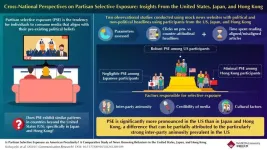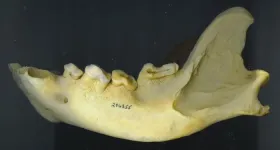(Press-News.org) New research in Social Psychological and Personality Science identifies a widespread stereotype linking wealth to perceived trustworthiness across diverse cultures. The research, led by Mélusine Boon-Falleur from the Center for Research on Social Inequalities at Sciences Po in Paris, shows that individuals with fewer material resources are consistently viewed as less trustworthy.
The study, conducted across eight countries including Brazil, Colombia, Democratic Republic of Congo, India, France, Nigeria, Philippines, and the United Kingdom, employed a novel method to uncover stereotypes while avoiding social desirability bias.
"People with fewer resources are consistently perceived to be less trustworthy by people around the world, even among individuals who have few resources themselves," states Dr. Boon-Falleur, summarizing the study's most significant finding.
This research contributes to the broader academic discussion by highlighting the importance of socioeconomic background in shaping stereotypes, alongside well-known demographic attributes such as gender, age, or race. It also emphasizes the need to consider both the characteristics of the person "doing the trusting" and the person being trusted when examining trust dynamics.
The implications of these findings are far-reaching. "By becoming aware of this stereotype, people may try to overcome this bias, or put in place programs in their organization to counteract this," Dr. Boon-Falleur explains. She adds, "For people with low SES backgrounds, realizing that they may be perceived as less trustworthy could explain certain attitudes or behaviors towards them."
In the context of current world events, the research suggests that deepening social inequalities in Western countries could lead to decreased social trust as poverty rates increase. It may also shed light on patterns of discrimination against certain migrant groups.
Dr. Boon-Falleur cautions against misinterpretation: "The main misrepresentation of these results would be to say that individuals with fewer resources are in fact less trustworthy rather than individuals with fewer resources are perceived to be less trustworthy. To date, there is no scientific evidence systematically showing that individuals with fewer resources are less trustworthy.”
One of the most striking aspects of the study is the universality of these stereotypes. "Often, we tend to think that highly capitalist countries or only Western countries have negative stereotypes towards certain groups," Dr. Boon-Falleur notes. "However, what we found in our study was that in all countries surveyed, including in places such as Goma (Democratic Republic of Congo), such stereotypes also exist."
Future research will explore the malleability of these stereotypes and their potential behavioral implications. The study's findings open new avenues for understanding and addressing socioeconomic biases in interpersonal trust on a global scale.
END
People with fewer resources seen as less trustworthy across cultures, new research shows
2024-11-11
ELSE PRESS RELEASES FROM THIS DATE:
Inland Delaware watersheds impaired by human waste
2024-11-11
Highlights:
Delaware watersheds show high microbial impairment.
Researchers collected samples from Delaware waters over 2 years and identified microbial DNA signatures present in the water.
The findings suggest that both treated and untreated human waste are the culprit, likely due to infrastructural issues.
Washington, D.C.—Delaware has numerous inland waterways with high microbial impairment from unknown sources. Now, a new study suggests that human waste, both treated and untreated, is responsible for the waterway impairment in these Delaware watersheds. The study was published in Applied and Environmental Microbiology, ...
Study on the ideas and methods of bloodletting therapy in the treatment of heat stroke
2024-11-11
Heat stroke is primarily classified into exertional and non-exertional forms. Exertional heat stroke results from strenuous physical activity in high heat, while non-exertional heat stroke typically affects those exposed to extreme heat without engaging in significant physical exertion. Symptoms include elevated body temperature, impaired consciousness, headaches, muscle spasms, and, in severe cases, cardiovascular overload, cerebral hypoxia, and organ failure. Western medicine’s primary treatments include cooling methods, rehydration, and pharmacological interventions like dexamethasone ...
New measures of patient well-being can be applied readily in clinical care
2024-11-11
Waltham — November 11, 2024 — Two measures of patient well-being, designed for use in busy clinical settings, are described in a Perspective piece in a supplement to Medical Care, the official journal of the Medical Care Section of the American Public Health Association. The journal is published in the Lippincott portfolio by Wolters Kluwer. The journal is published in the Lippincott portfolio by Wolters Kluwer.
The Medical ...
New study links historical redlining to delays in HIV treatment
2024-11-11
A new study from Tulane University finds that historical race-based lending practices are still impacting health today, linking these discriminatory policies to delays in effective HIV treatment within affected neighborhoods.
The lending practice, called redlining, was abolished in 1968. Yet, those living in once historically redlined neighborhoods experience 15% longer delays in achieving viral suppression of HIV compared to those in non-redlined areas, according to the study published in JAMA Internal Medicine.
The disparity can impact both individual ...
Understanding causes of echo chambers: Political news selective exposure across countries
2024-11-11
In our digital age, with easy access to a vast array of information, one would think that readers would naturally be exposed to a wide range of perspectives. However, the opposite seems to be happening, especially in countries like the United States (US), where people often seek out news that reinforces their existing beliefs and avoid content that challenges them. This tendency, known as partisan selective exposure, has been linked to increasing divides and tensions between different ideological groups. But is ...
New study reveals unique adaptations of jaw function and tooth wear in hypercarnivores
2024-11-11
A new study led by Dr. Jack Tseng and published in PeerJ Life & Environment has shed light on the intricate relationship between tooth wear and jaw mechanics in highly carnivorous mammals, known as hypercarnivores. As mammalian teeth do not regenerate, these animals often face declining bite efficiency as their teeth wear down over time. This research explores how different hypercarnivorous species, including scavengers, meat specialists, and bone-cracking predators, adapt biomechanically and possibly behaviorally to manage the challenges posed by tooth wear.
The ...
Robot that watched surgery videos performs with skill of human doctor
2024-11-11
A robot, trained for the first time by watching videos of seasoned surgeons, executed the same surgical procedures as skillfully as the human doctors.
The successful use of imitation learning to train surgical robots eliminates the need to program robots with each individual move required during a medical procedure and brings the field of robotic surgery closer to true autonomy, where robots could perform complex surgeries without human help.
“It’s really magical to have this model and all we do is feed it camera input and it can predict the robotic ...
“Emotional contagion” a factor in senior’s mental health
2024-11-11
Madeleine and Paul are sitting on a park bench. As she tells Paul about her financial worries and how she’s been struggling for months to make ends meet, Madeleine’s eyes well with tears. Paul is moved by her distress; her woes resonate with him and heighten his own fears. His heart grows heavy and his own eyes become moist, too.
What’s going on? A kind of behavioural mirroring, what psychologists call “emotional contagion.”
“Just as some people are more likely to catch a respiratory virus through close contact, others are more susceptible to ‘catching’ the emotions of the people around them,” explained Marie-Josée ...
Fear of another heart attack may be a major source of ongoing stress for survivors
2024-11-11
Research Highlights:
Fear of another heart attack was a significant ongoing contributor to how heart attack survivors perceive their health, according to a new study.
While anxiety and depression are recognized as common conditions after a heart attack, they did not explain the impact of fear of recurrence in this study.
The researchers suggest that fear of another heart attack should be evaluated and addressed separately from depression and anxiety.
Note: The study featured in this news release is a research abstract. Abstracts presented at the American ...
Let’s talk about sex: Heart patients want guidance from health care professionals
2024-11-11
Research Highlights:
A small survey of adults aged 30 to 89 (average age of 65) in Sweden who have heart conditions found that there is a significant difference between the sexual health information they seek and what is provided to them by their health care professionals and the health care system.
Despite 76% of patients with heart conditions reporting that sexual health affects their mood and well-being, only 5% received information or counseling about sexual health.
Researchers suggest health care professionals adjust their patient care practices to ensure that discussing sexual health becomes a standard and respected topic in health ...


